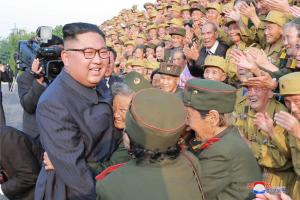WASHINGTON, D.C., Dec. 12 (UPI) — North Koreans are a proud people who believe they have “taken their destiny in their own hands” with the development of nuclear weapons, a former British ambassador to Pyongyang said Wednesday.
John Everard, who was the top British envoy to the impoverished North from 2006-08, told UPI the North Koreans “absolutely” seek unification and would tell him “Korea is one,” during his years as a foreign service officer.
The vision North Korea holds for unification may be different from the South’s, however.
“These are proud people. They are proud of their country, proud of what it’s achieved,” Everard said before an audience at the Global Peace Foundation’s International Forum on One Korea in Washington.
Nuclear weapons have been a symbol of the Kim Jong Un regime’s military strength. While some indefinite agreements on denuclearization may have taken place between Kim and U.S. President Donald Trump in 2018, their significance to the North Korean state should not be underestimated, according to Everard.
As the year draws to a close, marked by an unprecedented level of engagement between North Korea and the United States, and between Kim and South Korean President Moon Jae-in, debate is remarkably absent in South Korean society over how unification, or some level of integration, could safely take place, Everard said.
There is a “deep reluctance by the [presidential] Blue House [in Seoul] to initiate a debate” on unification, the British diplomat said.
While most South Koreans have welcomed the North’s turn away from nuclear weapons tests, civic groups are divided over a potential Kim Jong Un visit to Seoul.
Moon’s summits with Kim in Panmunjom and Pyongyang were commemorated with countless photo opportunities, followed by Seoul’s official interpretations of the results of the summit.
But tough questions, including how close engagement and eventual integration will be financed, are not being addressed, Everard said.
“I think we have to face the hard fact in the short to medium term reunification of Korea is going to be hideously expensive.
Nobody has come up with a plausible range of how much it’s going to cost,” he said.
One solution to ease public concerns in South Korea over unification, or preliminary unification costs, has been to promote and move forward with inter-Korea economic projects.
South Korean teams have surveyed North Korean railroads and are exploring the possible relinking of tracks along the inter-Korea Gyeongui Line.
Igniting economic reform in the North, and lifting up the South’s post-industrial economy along with the potential changes, is something the South Korean left and right both want in their policies.
“For a very long time each [South Korean] president has come to office, clearly determined they are going to be the one who is going to crack this very difficult issue,” Everard told UPI.
Moon’s predecessor, former President Park Geun-hye, promoted South Korea’s policy to the North with the promise unification would be a “bonanza” that provides a much needed boost to the South Korean economy.
Alicia Campi, a former U.S. diplomat and president of the Asian Politics and History Association, said Wednesday North Korea provides a “final piece of the transport puzzle” that lies with the linking of Seoul to Sinuiju on the Gyeongui Line.
The economic benefits would be enormous, Campi said.
Linking the train tracks across the demilitarized would connect 70 million people on the Korean Peninsula to Eurasian railroads that would create overall regional integration.
A Korean rail route would open a “gateway” to the Eurasian transport network, she said.
The Global Peace Foundation is affiliated with the ultimate holding company that owns United Press International.

COMMENTS
Please let us know if you're having issues with commenting.